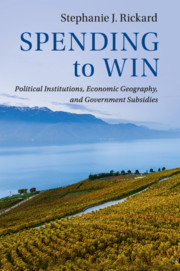Crossref Citations
This Book has been
cited by the following publications. This list is generated based on data provided by Crossref.
Jensen, Nathan M.
2018.
Bargaining and the effectiveness of economic development incentives: an evaluation of the Texas chapter 313 program.
Public Choice,
Vol. 177,
Issue. 1-2,
p.
29.
Fiva, Jon H.
Halse, Askill Harkjerr
and
Smith, Daniel M.
2019.
Does Local Representation Matter?.
SSRN Electronic Journal ,
Broz, J. Lawrence
Frieden, Jeffry
and
Weymouth, Stephen
2019.
Populism in Place: The Economic Geography of the Globalization Backlash.
SSRN Electronic Journal ,
Harada, Masataka
and
Smith, Daniel M.
2019.
Distributive Politics and Crime.
SSRN Electronic Journal,
Meng, Anne
2020.
Constraining Dictatorship.
Rickard, Stephanie J.
2020.
Economic Geography, Politics, and Policy.
Annual Review of Political Science,
Vol. 23,
Issue. 1,
p.
187.
Postnikov, Evgeny
and
Bastiaens, Ida
2020.
Social protectionist bias: The domestic politics of North–South trade agreements.
The British Journal of Politics and International Relations,
Vol. 22,
Issue. 2,
p.
347.
Jensen, Nathan M.
Findley, Michael G.
and
Nielson, Daniel L.
2020.
Electoral Institutions and Electoral Cycles in Investment Incentives: A Field Experiment on Over 3,000 U.S. Municipalities*.
American Journal of Political Science,
Vol. 64,
Issue. 4,
p.
807.
Ballard-Rosa, Cameron
2020.
Democracy, Dictatorship, and Default.
Colgan, Jeff D.
Green, Jessica F.
and
Hale, Thomas N.
2021.
Asset Revaluation and the Existential Politics of Climate Change.
International Organization,
Vol. 75,
Issue. 2,
p.
586.
Jensen, Nathan M.
and
Thrall, Calvin
2021.
Who's Afraid of Sunlight? Explaining Opposition to Transparency in Economic Development.
Business and Politics,
Vol. 23,
Issue. 4,
p.
474.
Schito, Marco
2021.
The politics of State aid in the European Union: explaining variation in aid allocation among Member States.
Journal of Public Policy,
Vol. 41,
Issue. 2,
p.
277.
Broz, J. Lawrence
Frieden, Jeffry
and
Weymouth, Stephen
2021.
Populism in Place: The Economic Geography of the Globalization Backlash.
International Organization,
Vol. 75,
Issue. 2,
p.
464.
Schonfeld, Bryan
2021.
Trading Places, Trading Platforms: The Geography of Trade Policy Realignment.
International Organization,
Vol. 75,
Issue. 4,
p.
959.
Schito, Marco
2021.
A Sectoral Approach to the Politics of State Aid in the European Union: an Analysis of the European Automotive Industry.
Journal of Industry, Competition and Trade,
Vol. 21,
Issue. 1,
p.
1.
Danzman, Sarah Bauerle
and
Slaski, Alexander
2022.
Incentivizing embedded investment: Evidence from patterns of foreign direct investment in Latin America.
The Review of International Organizations,
Vol. 17,
Issue. 1,
p.
63.
Gulotty, Robert
2022.
WTO Subsidy Disciplines.
World Trade Review,
Vol. 21,
Issue. 3,
p.
330.
Wiedemann, Andreas
2022.
Redistributive Politics Under Spatial Inequality.
SSRN Electronic Journal,
Murillo, María Victoria
and
Pinto, Pablo M.
2022.
Heeding to the Losers: Legislators' Trade‐Policy Preferences and Legislative Behavior.
Legislative Studies Quarterly,
Vol. 47,
Issue. 3,
p.
539.
Rickard, Stephanie J
2022.
Interests, Institutions, and the Environment: An Examination of Fisheries Subsidies.
International Studies Quarterly,
Vol. 66,
Issue. 2,



